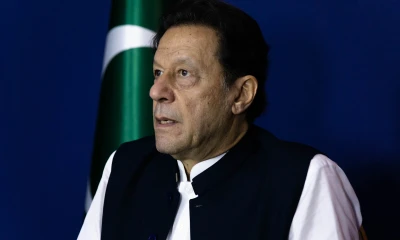Edited by Deepali Verma
It’s not the first time that Bharat’s western neighbour that came into being in 1947 after a bitter partition is going to polls with an imprisoned former prime minister. As Pakistan is headed towards the polls on February 8, Imran Khan, the South Asian nation’s Cricket World Cup-winning captain-turned-politician is the prisoner number 804 at a jail in Rawalpindi, which is Islamabad’s satellite town that houses Pakistan Army’s headquarters.
This Muslim-majority country with a population of 241 million holds a rare distinction as a state where no prime minister has ever finished a full term. The elections have a widely believed notion to be ‘selections’ by the military-intelligence nexus that has for long dominated the country’s politics and has directly ruled for several decades.
The former Pakistani prime minister was ousted from power owing to a parliamentary no-trust-vote in April 2022. His administration underwent replacement with a coalition government led by Shehbaz Sharif.
That replacement of the coalition was by an unelected caretaker government in August 2023.
During a political rally held on 3 November 2022, Khan was shot in an assassination attempt in Wazirabad, Punjab. As his falling out with the country’s powerful army dominated the political discourse, dozens of cases followed Khan’s way.
Then a major moment of reckoning came.
The supporters of Imran Khan’s pulled off a ‘mini-intifada’ in May 2023 against the Pakistani military.
It was only a matter of time before a number of high-profile exits took place from the PTI that rocked the boat of populism Khan was sailing in.
Khan has been in custody ever since August 2023 following a conviction in a corruption case. This was among dozens of cases lodged against him since he was ousted from power after a parliamentary no-trust vote in April 2022.
On August 9, 2023, Pakistan’s election commission handed Khan disqualification for five years.
Pakistan’s courts handed down two more sentences to Khan just days before polling, who was already serving three years in prison.
Even during Khan’s arrest, he deployed Artificial Intelligence to campaign. Following this was Pakistan’s election commission’s order that stripped his Pakistan Tehreek-e-Insaf (PTI) of its election symbol, the cricket bat. This order has emerged as a final blow to whatever was left of Khan’s prospects in the elections after his fallout with the army.
Pakistan has one of the lowest literacy rates in South Asia. Imran Khan has strongholds in the predominantly tribal Khyber Pakhtunkhwa province that is particularly backwards in terms of Human Development Indicators. Voters in such tribal areas identify Khan’s party primarily with its bat symbol. Given Khan’s fantastic record as one of the finest cricketers Pakistan has ever produced, his party is identified with the cricket bat across Pakistan.
‘Ballay pe thappa’ (Stamp on the Bat) was the rallying call for Khan’s supporters in 2018 when the PTI chief, then backed by Pakistan’s army-intelligence complex, managed to put together a coalition to be in Islamabad’s Prime Minister’s Office.
The PTI-backed candidates are now taking part in elections as independents with their own symbols.
The party has come up with a website where voters can put in their constituency and discover their PTI-backed candidate’s symbol.
The speculations are running high for February 8 to see if Khan will be able to bowl out the opposing parties from prison.

















